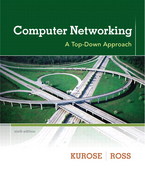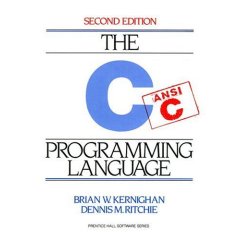Syllabus
CSSE 432 – Computer Networks
General Course Information
Disclaimer: The material on this syllabus is subject
to change at your instructor's discretion. When changes are
made, you will be notified by your instructor.
Course catalog description
Organization, design, and implementation of computer networks, especially the
Internet. Network protocols, protocol layering, flow control, congestion control,
error control, packet organization, routing, gateways, connection establishment and
maintenance, machine and domain naming, security. Each of the top four layers of the
Internet protocol stack: application (FTP, HTTP, SMTP), transport (TCP, UDP), network
(IP), link (Ethernet).
General course description
During this course you will learn a lot of new jargon, including many TLAs (Three Letter Abbreviations). These provide the vocabulary for describing modern networks and their features. (Note that an acronym is an abbreviation that can be pronounced, like LAN: Local Area Network. Most TLAs are unpronounceable, so they are not acronyms, just abbreviations.) In addition to mastering the vocabulary, you will learn how the services of the internet are supported by routing and control mechanisms, how different devices participate in networks, and how security is provided and attacked.
You will learn how to program with sockets in C using UDP/IP and how to implement the routing function on a virtual network. You will learn how to examine network traffic using a packet sniffer.
Prerequisites
- CSSE 220: Object-Oriented Software Development or
- CSSE 221: Fundamentals of Software Development Honors
Meeting times and places
-
Section 1 (Delvin Defoe): 10th period (4:20 to
5:10); Monday, Tuesday, and Friday in O159; 6th period (12:40 to
1:30); Wednesday in O257.
Instructor
Delvin Defoe
– Associate Professor of Computer Science and Software Engineering
|
Email:
|
defoe <at> rose-hulman <dot> edu
|
|
Office phone:
|
(812) 877-8815
|
|
Office address:
|
Moench F-214
|
|
Home page:
|
http://www.rose-hulman.edu/~defoe
|
|
Office hours:
|
I strive to be in my office every day, except Thursday, from 9 a.m. until 5 p.m. unless I’m in class or a meeting. Please stop by whenever. If my door is shut, just knock.
NOTE: I will not be on campus on Thursdays.
|
Course Assistants
Alex White
whiteaj
<at>
rose-hulman <dot> edu
|
Besides the instructors and assistants, other students in the
course can often be a great source of help to
you. They will learn more if they help you
understand the concepts with which you
struggle.
Don’t try to be the Lone Ranger in this course. If you
find that you have worked on something for 30
minutes without making any progress,
it’s probably time to seek help.
Texts
Required text

Computer Networking: A Top-Down Approach(sixth edition), by James F. Kurose and Keith W. Ross. Here's a link to the book's website: http://wps.pearsoned.com/ecs_kurose_compnetw_6/.
Paperback: 864 pages
Publisher: Addison Wesley (2013)
Language: English
ISBN-10: 0-13-285620-4
Other References

C Programming Language, Second Edition, by Brian W. Kernighan and Dennis M. Ritchie
Paperback: 274 pages
Publisher: Prentice Hall PTR; 2 edition (March 22, 1988)
Language: English
ISBN-10: 0131103628
ISBN-13: 978-0131103627
This book, known by most computer scientists simply by the authors' initials
K&R, is a classic reference. We won’t refer directly to this book in the course, but if you will be using C later in your career, either as a student or a professional, we encourage you to add this reference to your personal library. (All CS, SE, and CPE
students will use C in later courses. Many other majors will
also encounter courses where C is required.)

Pocket Guide to TCP/IP Socket Programming in C, by Michael J. Donahoo and Kenneth L. Calvert
Paperback: pages
Publisher: Morgan Kaufmann (2000)
Language: English
ISBN-10: 1-55860-686-6
Course Materials
We’ll use Moodle to post grades and materials that require restricted access (like
quiz and homework solutions). Most of the other course materials are posted on the
Rose-Hulman AFS server, so you can access them directly without logging in to Moodle.
Learning Outcomes
Students who successfully complete this course should be able to:
- Identify terms of computer networking.
- Outline networking services and how they are provided by
multiple layers of protocols.
- Describe principles and mechanisms of congestion control
in networks.
- Describe principles and mechanisms of routing in networks.
- Analyze security mechanisms for networks and why they are needed.
- Implement computer networks protocol components and applications
including reliable file transfer services.
Labs,
Homework, and Projects
You are expected to complete all reading (textbook and slides) for each class session BEFORE coming to class. In-class discussions will assume that you have done the reading and understood the “easy stuff” before class. You may of course ask about any details that you do not understand. We strongly believe that reading the textbook will help you. You may be able to “get by” without reading the text. But did you come to Rose to “get by” or to be the best?
We will assign a number of lab exercises or programming problems. Some of these
problems will help you explore the details of real Computer networks
by implementing selected computer networks protocol components and applications.
We anticipate that you will spend some time working on these
assignments. Mastery of the concepts involved with these assignments
is required in order to excel in the course. Some of these
assignments will be done in groups, while others will be done
individually.
Your solutions to
programming problems
should be well-designed and well-documented. We will suggest working on some programming problems with another person; however we will designate some problems as individual assignments.
We will also assign a number of in-class exercises as well as
homework problems. Some of these exercises will be done
individually, while others will be done in groups. Both the
individual and group exercises will contribute to your final grade
for the course.
Here is a summary of the assignments you should expect to complete
- Readings as assigned for each class.
- Weekly homework exercises.
- Labs.
- Final project that will deal with routing.
- Two mid-term exams.
- Take home exam toward the end of the course.
Grading
We plan to use the weighting scheme shown in the table below when assigning final grades.
|
Criteria
|
Weight
|
|
Quizzes
|
10%
|
|
Homework
|
20%
|
|
Labs and Project
|
30%
|
|
Exams |
40%
|
Final grades are contingent on the following:
-
You must have a passing average on the labs and project to pass the course.
-
You must have a passing average on the exams to pass the course.
-
Attendance is required, as detailed below.
Letter Grades
We will do our best to conform to the Rose-Hulman definition of the various grades, as described in the
Academic Rules and Procedures. Note in particular that the phrase ”thorough competence to do excellent work“ appears there in the description of the “B” grade, and it further states that “B” and “B+” will not be given for mere compliance with the minimum essential standards of the course.
We will not grade on a curve, so every student could earn an “A”. But it will require significant effort to do so.
Citizenship Counts!
We expect every student to display good citizenship in the CSSE 432 learning community. This includes attendance, promptness, preparation for class, positive participation in class, constructive partnership in pair and group assignments, timely completion of various surveys, and peer evaluation of other students’ code and of your team members for group projects.
The in-class time in this course constitutes an important learning experience. After two unexcused absences, you must discuss continuation of the course with the instructor.
Three unexcused absences may result in failure of the course.
Late Assignment Policy
Unless a grace period† is offered for an
assignment, all assignments MUST be
turned in before the due date and time in order for
you to receive credit for them. Failure to turn in an assignment before the due
date and time will result in receipt of zero credit.
†grace period::
Occasionally, the entire class will be allowed extra time for everyone
to complete a particular assignment without “extending the due date.”
If you are working on an assignment during a
grace period, you should do so with the recognition that you are behind,
and you need to quickly finish it and move on to the next assignment. If
there is a grace period for an assignment, a reason for
it will be given.
Communication
This term we will be using Piazza for class discussion. The system is highly catered to getting you help fast and efficiently from classmates, the TAs, and the instructors. Rather than emailing questions to the teaching staff, I encourage you to post your questions on Piazza.
Bookmark our class page: https://piazza.com/rose-hulman/spring2014/csse432/home.
Electronic Distraction Policy
We do our best to keep class interactive. But we recognize that sometimes it is hard as a student to stay focused on the class. With laptops in class, there are many more ways to become distracted. Unfortunately these distractions are much more pernicious, since it is very easy to get drawn into things like IM conversations or RSS feeds.
We strongly encourage you to turn off IM and email software and only use other software for things directly related to class.
If you choose to use non-class-related software during class, then you must sit in the back row.
Doing so will prevent your classmates from being distracted by what is on your screen.
Integrity
Recall the
Institute general policy on discipline and suspension:
“Rose-Hulman expects its students to be responsible adults and to behave at all times with honor and integrity.”
Exams and homework will be done on an individual basis. The simple rule of thumb for individual work is:
Never give or use someone else’s code or written answers.
Such exchanges are definitely cheating and not cooperation. The
departmental statement on academic honesty
has more detailed advice.
We encourage you to discuss the problems and general approaches to solving them with other students. However, when it comes to writing code, it should be your own work (or the work of your group if it is a group or partner assignment). If you are having trouble understanding how some library code works or pinning down a run-time or logic error in your program, by all means talk to someone about it.
If you use someone else’s ideas in your solution (or any other work that you do anywhere), you have to:
-
give credit to that person in the comment section of your program, and
-
be sure that you understand it as well as if it were your own.
If you are ever in doubt about whether some specific situation violates the policy, the best approach is to discuss it with your instructor beforehand. This is a very serious matter that we do not take lightly;
nor should you.
In general, you should not look at another student’s code to get ideas of how to write your own code. Beginning the process of producing your own solution with an electronic copy of work done by other students is never appropriate.
Plagiarism or cheating will result in a negative score (i.e., less than zero) for the assignment or exam. Egregious cases will result in a grade of “F” for the course. More importantly, such dishonesty steals your own self-esteem. So don’t cheat.
Developed by Delvin Defoe


